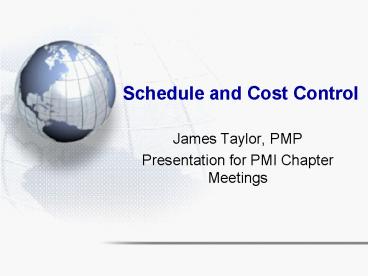Schedule and Cost Control - PowerPoint PPT Presentation
1 / 23
Title:
Schedule and Cost Control
Description:
The practice of Schedule and Cost Control can be summarized by these four ... 1.1 Major project subsystem 1. 1.2 Major project subsystem 2. 1.2.1 Task 1 ... – PowerPoint PPT presentation
Number of Views:70
Avg rating:3.0/5.0
Title: Schedule and Cost Control
1
Schedule and Cost Control
- James Taylor, PMP
- Presentation for PMI Chapter Meetings
2
Objectives
- This presentation will discuss these critical
points of project schedule and cost control
components - What is schedule and cost control and why do we
need it? - How does the project relate to the business
strategy? - Requirements definition and development
- Project planning
- Project monitoring and control
- Project Closeout
3
What is Schedule and Cost Control?
- The practice of Schedule and Cost Control can be
summarized by these four project management
actions - Directing progress
- Directing actions
- Controlling results
- Conserving resources
4
Why Schedule and Cost Control?
Schedule
Cost
Scope
5
Affect of Schedule, Cost, or Scope Changes
Cost
Cost
Schedule
Schedule
Scope
Scope
Affect of cost and schedule on each other
Affect of cost and/or schedule on scope
6
How the Project Fits in the Organization
Portfolio
Programs
Projects
7
The Keys to Successful SCC
- There are six key project management knowledge
competences that the successful project manager
MUST possess. They are understanding - Requirements interpretation and development
- Developing good work breakdown structures
- Developing and interpreting network analyses
- Developing accurate schedules
- Developing accurate budgets
- Implementing and using earned value analysis
8
Developing Requirements
- Basics of requirements development
- Understanding where requirements originate
- Understanding how to determine what is and what
is not a requirement - Understanding types of requirements
- Functional requirements
- Non-functional requirements
- Hidden and generated requirements
9
Work Breakdown Structures
- There are two ways to display a work breakdown
structure (WBS) - Graphical
- Indented
10
Example of a Graphical WBS
Project or Contract Name 1.0
Level 1
Major Project Subsystem 1 1.1
Major Project Subsystem 2 1.2
Major Project Subsystem 3 1.3
Major Project Subsystem 4 1.4
Level 2
Task 1 1.2.1
Task 2 1.2.2
Level 3
Subtask 2 1.2.1.2
Subtask 1 1.2.1.1
Level 4
Work Package 1 1.2.1.2.1
Work Package 2 1.2.1.2.2
Level 5
11
Example of an Indented WBS
1.0 Project or Contract Name 1.1 Major project
subsystem 1 1.2 Major project subsystem
2 1.2.1 Task 1 1.2.1.1 Subtask 1 1.2.1.2
Subtask 2 1.2.1.2.1 Work package
1 1.2.1.2.2 Work package 2 1.2.2 Task 2
12
The WBS and the Organization
13
WBS Dictionary
14
Network Analyses
There are two common network diagramming methods
PERT and PDM
WBS 1.1.1
WBS 1.1.2
WBS 1.3.2
Start
WBS 1.2.1
End
Activity on the Arrow (AOA) Diagram
WBS 1.2.2
WBS 1.3.1
WBS 1.1.1
WBS 1.2.1
WBS 1.2.2
Start
End
Activity on the Node (AON) Diagram
WBS 1.1.2
WBS 1.3.1
WBS 1.3.2
15
Relationship of WBS to Network Diagramming
WBS 1.0
WBS 1.1
WBS 1.2
WBS 1.3
WBS 1.1.1
WBS 1.1.2
WBS 1.2.1
WBS 1.2.2
WBS 1.3.2
WBS 1.3.1
WBS 1.1.1
WBS 1.2.1
WBS 1.2.2
Start
End
WBS 1.1.2
WBS 1.3.1
WBS 1.3.2
16
Budget Estimate Basics
- There are three basic types of budget estimates
- Rough order of magnitude
- Top down or
- Bottom up or engineering estimate
17
Cost Categories
- The common cost categories and budget terminology
of interest to the PM are - Direct costs
- Other direct costs
- Indirect costs (general and administrative)
- Fixed costs
- Variable costs
- Sunk costs
18
Integrating WBS with Work Packages
19
Earned Value ManagementWhat it is
- Earned valued management is the preferred way of
monitoring and controlling projects - Introduced by the DoD in September, 1968
- Used widely by defense contractors in the 70s and
80s - Adopted by the private sector in the late 80s
- PMI and most industries consider EVM to be THE
method for monitoring and controlling projects
20
What is Earned Value Management?
- Earned value focuses on three primary components.
The are - Planned valueThe budgeted cost of the
task/project - Actual costThe cost that is actually spent
during the implementation and development of the
task deliverable - Earned valueThe amount earned against the
budgeted estimate
21
The Three Components of EVM
Today
Dollars
SV
CV
EV
PV
AC
Time
22
Closing a Project
- Two types of audits are required at close out
- Technical audit
- Financial audit
23
Summary
- The practice of Schedule and Cost Control can be
summarized by these four project management
actions - Directing progress
- Directing actions
- Controlling results
- Conserving resources
- There are six key project management knowledge
competences that the successful project manager
MUST possess. They are understanding - Requirements interpretation and development
- Developing good work breakdown structures
- Developing and interpreting network analyses
- Developing accurate schedules
- Developing accurate budgets
- Implementing and using earned value analysis

